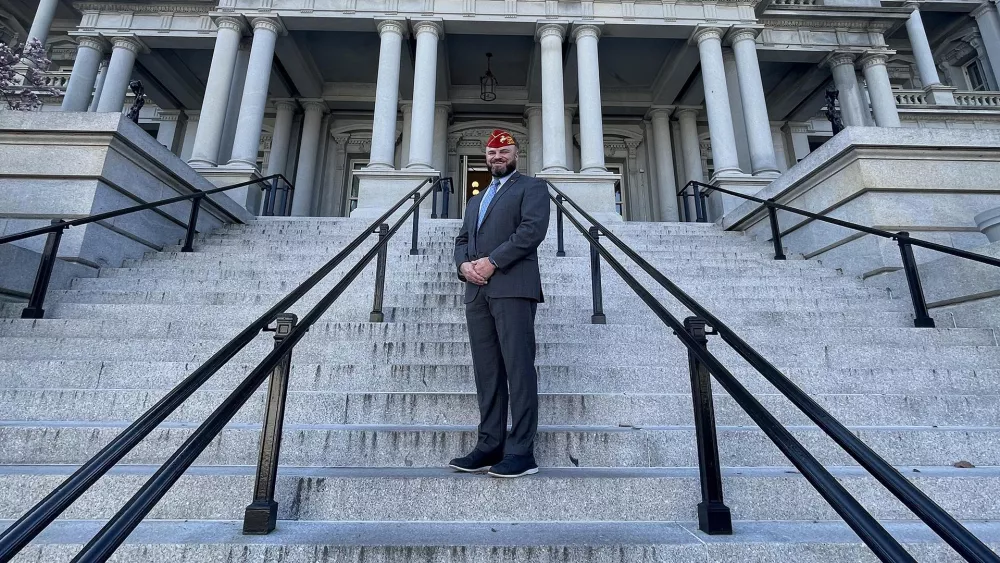An Advocate for Financial Education for Veterans
New program director heads to Washington, D.C. to advocate for financial education for military members.
Subscribe to Newsletter
Related Posts
FinServe Network Convenes for 2025 Summit
View DetailsMarch 16, 2023
When Chet Bennetts, CFP®, CLU®, ChFC®, RICP®, CLF® was deployed to Iraq as part of his service with the United States Marine Corps, his unit was presented with some bleak projections.

“We were among the first teams inserted into urban areas, and we were involved in door-to-door combat,” he said. “We were told to expect at least 30% casualties and nearly everyone would probably be injured. In the end, those estimates were pretty accurate.”
Bennetts was among those wounded during the campaign, and after being medically discharged from the military, he occupied himself with other pursuits: entering the financial services profession and starting a new career, as well as a new family. However, years later he got a piece of news that once again spurred him to act on behalf of his fellow service members and veterans.
“As of November 2018, I had lost more of my Marine brothers to suicide post-service than in actual military combat,” he said. “That was a real wake-up call for me, and I couldn’t understand why nobody seemed to be discussing this problem from the lens of how personal finances might play a role.”
Now The College’s CFP® Certification Education Program and Chartered Financial Consultant® (ChFC®) Program Director, Bennetts says it’s been long established that service members on the battlefield won’t be as effective if they’re preoccupied with a toothache or something else physically wrong with them – but financial well-being is just as important as physical well-being to maintaining combat readiness.
“It’s just as problematic, and maybe even more so, for a service member to worry about how they’re going to pay their car insurance or afford their mortgage payment,” he said. “The biggest sources of stress for people are usually money and relationships, and if you dig deeper into many of those relationships, the cause is often still money. I found the academic community wasn’t discussing this in the context of preventing veteran suicide, so I decided to go back to school to confront this issue more seriously.”
While Bennetts said programs by the VA to address physical and mental health problems for service members and veterans, including PTSD, are incredibly important to maintain the well-being of those individuals, financial health is often left out of the conversation. In addition, statistics show that over 20 veterans die by suicide daily in the U.S. on average, demonstrating a significant need for more services to support them. Bennetts says “financial empowerment” is an important part of that equation.
While studying for his PhD in Personal Financial Planning through Kansas State University and still focusing on the issue of financial well-being for military members, Bennetts says he was presented with the opportunity to be part of a select group of student veterans who would be able to propose legislation based on their research. He applied for and was awarded one of the Veterans of Foreign Wars’ (VFW) Student Veterans of America (SVA) Legislative Fellowships, earning the privilege of traveling to the nation’s capital in Washington, D.C., and presenting his findings to those in positions to take action on them.
“All the fellows had different ideas to present,” he said. “One student was working on issues surrounding veterans’ housing insecurity. Another dealt with National Guard members’ life transitions if they were called in to deal with a natural disaster. Mine had to do with financial services, financial counseling, and its integration into PTSD treatment. This was the VFW’s national legislative advocacy week, so there must have been at least 500 of us as VFW members participating from every state and territory going to their individual representatives and pitching their proposals to elected officials.”
It appears Bennetts’ proposal caught the eye of the VFW’s Legislative Affairs team, who brought it to the rest of the organization’s leadership.
“I think they realized I wasn’t a 20-something reading off a script and that I was passionate about this issue and knowledgeable on it,” he said. “Before I knew it, it went from me only meeting with people from Kansas and Nebraska to getting a list of every event happening that week and being encouraged to attend as many of those as I could.”
Over the course of several days, Bennetts estimated he met with over 15 elected officials from nine different states, including Senator Bernie Sanders (D-VT) and Senator Jerry Moran (R-KS), a current member of the Senate Committee on Armed Services. And then, things went another step further.
“They asked us to come to the White House for a meeting,” he said. “I was astounded. We had to complete security clearance requests and meet with the president’s Special Advisor on Veterans Affairs. I got to talk with her and her team about how certain record-keeping practices at the VA were stopping us from getting a clear picture of the actual well-being of our veterans. I even became part of the testimony to the Joint House and Senate Oversight Committee for Veterans Services Organizations (VSO). I’m still processing all of it, to be honest. It was a whirlwind but also an amazing experience.”
Bennetts says he plans to continue his advocacy on financial empowerment for military members and veterans and that he’s been inspired by the entire Washington experience.
“When I reflect on the last four to five years of my life, there’s been a lot of uncertainty, especially regarding my journey toward my PhD,” he said. “That week without a doubt relit my fire to keep going, and it was an honor to be part of the conversation.”
Related Posts
FinServe Network Convenes for 2025 Summit
View Details